Racheline Maltese's Blog, page 14
March 25, 2016
Poly Yammery on The Hopeless Romantic
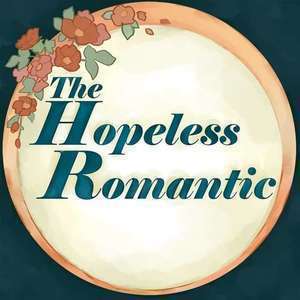 I recently recorded an episode of The Hopeless Romantic with Austin Chant and Amanda Jean focusing on polyamory in romance fiction. We cover a wide range of topics (see the blurb below) but particularly if you’re looking for info on our forthcoming novel The Art of Three with the 48-year-old heroine, there’s a ton on that in here. (TAo3 now has a contract offer, we’re just waiting for the paperwork to officially announce it, but assume early 2017.) There’s also a small bit of information on what’s next for Liam in book 4 of the Love in Los Angeles series.
I recently recorded an episode of The Hopeless Romantic with Austin Chant and Amanda Jean focusing on polyamory in romance fiction. We cover a wide range of topics (see the blurb below) but particularly if you’re looking for info on our forthcoming novel The Art of Three with the 48-year-old heroine, there’s a ton on that in here. (TAo3 now has a contract offer, we’re just waiting for the paperwork to officially announce it, but assume early 2017.) There’s also a small bit of information on what’s next for Liam in book 4 of the Love in Los Angeles series.
Author Racheline Maltese joins THR for episode 9, “Poly Yammery,” to discuss poly and ménage romance. Racheline discusses her upcoming poly book, which leads to deeper examination of writing poly: writing multiple dynamic characters, whether having a co-author helps, how different people do poly differently, and how Racheline feels about the perception that writing bi characters as poly is a negative trope.
The group is bemused by the trend of M/F/M ménage stories where there can be absolutely no content construed as “gay.” Racheline weighs in on whether being poly is inherently queer, and ultimately the group agrees that demanding receipts for someone’s identity is icky.
Finally, it turns out that in order to discuss tropes in a genre, there has to be enough content in said genre for there to be tropes in the first place. Get writing, folks.
Get the episode here: https://thehopelessromantic.simplecast.fm/episodes/33716-episode-9-poly-yammery


Three things being a (failed) beauty queen taught me about being a writer
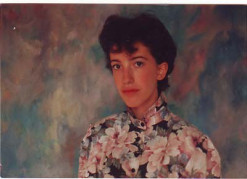
My “beauty” shot from when I entered the Miss New York National Teen-Ager Pageant 1987. Look, the 1980s were rough on everyone.
There are a lot of seemingly unlikely things in my past. I mean, let’s get real, that Mary Kay thing was a shocker to some of you. But I was also a teenage beauty queen.
Okay, not a queen — since I never won — but I did participate participate in beauty pageants as a teen, including the Miss New York National Teen-Ager 1987 pageant held in scenic Albany, New York. (Apologies to Albany, which I actually think is a super cute city, but the height of glamour and fame New York State’s capital is not).
I entered pageants, despite my parents’ objections, for all sorts of reasons. I wanted to be famous. I wanted to be beautiful. Intensely queer, I wanted to prove I was a “real girl.” And most importantly of all — I thought if I had a certificate or award attesting to any and all of those things that other kids would stop being mean to me.
Thanks, you can stop laughing now. Because I know what a three-diamond turn is and you don’t.
Anyway, just like that Mary Kay business, being a beauty queen also ran has taught me a few things about writing, publishing, and staying sane.
1. Much like I was a girl because I identified as a girl, you are a writer if you write. Period. End of discussion. You are a writer before you get published. You are a writer after you get published. You are a writer whether you write romance or literary fiction or poetry or personal essay or trivia books about Harry Potter (my first book!) or Duran Duran (Neil Gaiman’s first book!). People who don’t think you’re a real writer because of their genre biases or inability to remember we all enter life unpublished are not worth trying to win over.
2. Lots of parts of the publishing process are fun, but not that many of them are glamorous. The sequin dresses may have been fun, but still Albany. Not exactly where I was going to get discovered, even if Halle Berry once competed in that very same pageant system (that’s true!). Similarly, most of us aren’t going to be J.K. Rowling or another one of those out-of-the-gate hits (also out-of-the-gate hits usually have a long backstory; instant success is not only rare but rarer than we often think). This game is incremental and often relies on — in addition to talent — time, luck, and a robust back catalogue. Also paperwork, copy edits, and more administrativa than anyone wants to think about.
3. Not all awards are created equal. In Pageant Land, there’s Miss America, Miss USA, and then there is everyone else. The land of book awards isn’t dissimilar. Compete if you enjoy competing. Compete if you think there is a business benefit to doing so. Compete if you can afford the entry fees and feel what you get in exchange is valuable to you. Don’t feel bad if you don’t want to compete, can’t afford to compete, or compete and don’t win. You’re still a real writer, doing real writer things because you’re making words and wearing sequins dealing with all the glamour of being a writer — currently published or not!


March 17, 2016
Sales, discounts, and giveaways as of March 17, 2016
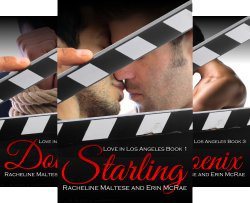 There are a bunch of sales on today (March 17, 2016) on our titles, so here’s the run-down:
There are a bunch of sales on today (March 17, 2016) on our titles, so here’s the run-down:
40% off everything ebook at Torquere (where most of my and Erin’s titles are) with code lucky2016. You can find all those books here: http://www.torquerebooks.com/index.php?main_page=index&manufacturers_id=550
If you prefer to shop at All Romance, they are having 25% off all our titles with both Torquere and Dreamspinner and their buy 10-get-1-free deal remains in effect. You can see those books here: https://www.allromanceebooks.com/storeSearch.html?searchBy=author&qString=Racheline+Maltese
If you would like to win a free e-book of Midsummer, you can enter to do so in this Amazon giveaway here: https://giveaway.amazon.com/p/9ff7f6bcd33c11b5


March 16, 2016
Guest post: Lioness in Blue launch/giveaway
Shira Glassman has a new erotic romance short out today, “Lioness in Blue.” To celebrate, she’s doing a giveaway, and below we have an excerpt from this new title. Enjoy and good luck!
Synopsis
First Oboe Dan Cohen may be twice her age, but Second Oboe Lauren Stern isn’t about to let that stand in her way. She’s been fantasizing about the man beside her in the symphony, and this might just be the concert where she finally finds out what it’s like to feel the scruff of his salt-and-pepper goatee against her skin.
If people are going to make intrusive comments about how much older he is, they can get over themselves. Not only is Dan an expert lover who knows how to take care of a woman, but he doesn’t want her to be gentle–quite the opposite!
Excerpt
Lauren took a deep breath. English horn solo, take two. “You’re a really cool guy.”
Dan studied her with careful brown eyes. “Is this ‘you’re a really cool guy’, or ‘you’re a really cool guy, but’?”
Lauren’s mouth exploded into a firework of a smile. “It’s ‘you’re a really cool guy.'” A giggle escaped, at the cleverness and elegance of his question.
Dan grinned. “Good! You’re not so bad yourself.” He seemed to be absorbing the sight of her, and Lauren basked in the sunlight of his admiration. “I take it this means you’ll have dinner with me between tomorrow’s rehearsals? Lunch–dinner–linner?”
“Yeah, that’d be great!” The world around Lauren seemed to be humming in concordance, the air in tune with the ground. Her body felt fluid and graceful as if she were suspended in water.
“So, what brought this up? Why now?”
Lauren rolled her eyes at herself and snorted a little. “Someone misread my face earlier and got the wrong idea, so I wanted to make sure you got the right idea in case she talked to you later.”
Dan nodded. “Oh, okay, that makes a little more sense. I thought — well, you caught me off guard. For a moment there I thought you’d pulled me off somewhere quiet because you couldn’t make it through rehearsal without kissing me.”
Lauren’s face burned with sweet, ridiculous heat. “Not gonna lie, I’d love to!”
He drew her near with a guiding hand on her upper arm, and her pounding heart poured fire between her legs. “Hell, if we can’t eat, we might as well, right?”
She’d never been this close to his face before, close enough to smell cedar on his skin. “You don’t want to know how many times I’ve thought about this.”
“Oh, yes, I do.” With his arms encircling her so that she rested safe within a cocoon of sturdy masculinity, he kissed her.
The world ground to a halt as she greedily took his kisses like dry summer earth drinks rain. His beard and mustache brushed her face in comforting accompaniment, which was novel—her last two partners had been a man who shaved, and a woman. It enhanced the Dan-ness of the act, somehow, like his facial hair created a whole new way to be kissed.
 Author Bio
Author Bio
Shira Glassman is a bisexual Jew (or possibly twelve tiny bisexual Jews in a trench coat) living in Florida with an activist and a Very Bad Cat. She has played violin, both classically and Appalachian/Irish folk, for thirty years as of the publication of this book. The oboe players in her life are still speaking to her—for now.
Facebook Author Page | Twitter | Blog | Tumblr


March 14, 2016
m SLASH m – a guest post from Erica Kudisch
Erica Kudisch is the author of The Backup, a fantastic (and fantastically reviewed) new LGBT novel involving music, Greek gods, and much mayhem. Note: The Backup is not a romance, but if it’s the right book for you, it’s really, really the right book for you. You can find out more about Erica and The Backup below her post:
A lot of the people who read this will have already been keeping up with the #BiMatters discussion on Twitter. In these recent weeks, the debate about representation in m/m fiction has branched off into several related discussions about author disclosure, the fetishization of gay men, and what kind of identities the characters in queer fiction can hold.
I’ve kept relatively quiet on pretty much all debate fronts, mostly because I have no horse in the Romance race. I write LGBT fiction, some of which has an erotic component, but I’m not publishing in the romance genre because my stories aren’t generally about two people who get together. But the central characters of every story I’ve published are queer, and since I plan to keep it that way, I feel like I have to address some of these issues in the m/m romance community because they bleed over into my sphere. And if I want to write a Happy Ever After someday, I want the community to feel mindful and open to my perspective, which it apparently isn’t. So I’m going to share my perspective. And maybe my view from the shallow end is a useful view of the pool.
I came into writing through fanfic. I’m 100% open about this in my professional life. In over fifteen years on the Internet I’ve written in fandoms of every size, Eastern and Western, for everything from children’s books to musicals to violent seinen manga. I’ve been in communities built around yaoi and slash, and communities that venerate gen and meta-, some that fracture and factionalize and some too small to break apart. I’ve been in fannish spaces dominated by cis straight men (and been assumed to be one, that was fun), and spaces created by straight women, and queer spaces, and the rare all-inclusive ones. But all of these fandoms have common behaviors, and chief among them is the acknowledgment of a canon. Whether you’re throwing it out the window for a firehouse AU or filling in the gloryholes the author left or curating a dossier of Jack’s one-night-stands, it’s hard to deny that something someone else created brought your community together.
I know I’m not the only person who started writing original fiction because of fandom, and how I think about writing has changed in that transition. For one thing, there is no canon anymore. I’m the author. I’m the showrunner. Nothing in my work is something someone else put there. Sure, it’s been edited (a lot), but I don’t have a producer insisting we need to appeal to a certain demographic, or a censor telling me there’s too much overt gayness, or an actor leaving for a new project whose character has to be put on a bus. There’s no arbiter anymore of what I can and can’t write without being a “good fan”, because I’m not a fan in this context. I’m an author.
But a lot of the mentalities of fandom are common to the original m/m community. Some of the good ones, of course: like fandom, m/m fiction is generally a queer-friendly space, and one where so many different people feel comfortable exploring their kinks and desires. It broadens the scope of fictional tropes by queering them. It has the potential to normalize and equalize social behaviors that other spaces condemn.
And the pitfalls of fandom crossed over with the perks.
Think of how slash fandom works, no matter the iteration: there are two men in a canon, and the fans turn them into a ship. To do this, the fans mine for justification and subtext, because usually, these characters aren’t declaring their passionate love for each other in canon. In fact, it’s likely that at least one of the men has a different love interest in canon, and that love interest is probably a woman. So what’s a slash fan to do? If you pretend the woman never existed, are you still writing fanfic for the series you claim to like? If you acknowledge that Dude A is attracted to her, does that invalidate his potential to pork Dude B? Back in the day, slash and yaoi fans bashed the living hell out of Relena, Rinoa, and Ginny because they got in the way. They couldn’t not acknowledge these characters, but thought they had to diminish them and their importance because their very existence impugned upon the m/m relationship. And I think that striving for perceived canonicity is a huge part of that: at any moment, the showrunner could throw a wrench into the slashers’ lovingly lubricated gears. Or, in a closed canon, a Dreaded Het Fan could crash the machine with a well-timed manifesto explaining why the authors themselves created this One True (Canon) (Heterosexual) Pairing.
Thank fuck the climate has changed, right? I mean, at least it’s not about canonicity anymore. Fandom has mostly gotten over the idea that the creators have descended from on high, and creators are also starting to include more non-het representation. Or trying, at least. But that same insidious misogyny has stuck around in fandom and original fiction alike, even if it’s changed its shape, because now we’re talking about how female characters in m/m fiction a constant threat of heteronormativity, and how bisexual characters aren’t gay enough to be considered progressive, and how m/m implies cis-m/cis-m and any vaguely vaginal anatomy makes it less queer. It’s the same story, rebooted for a new audience. It’s still discomfort with female characters and their potential to undermine a gay pairing.
And I get it. Believe me, I’ve been there. In some of my work, I’ve chosen to write about male characters because telling the same story with female or NB characters would make me personally uncomfortable. I’ve worried about the immediate perception of a female character as archetype and a male equivalent as default. My lead in The Backup is mixed-race, and I worried that people would think I was laying it on thick with a plot about the universe trying to “put him in his place” if I told his story with a non-white female lead. And I always, always worry about people accusing me of writing a story that’s too autobiographical, because I have seriously internalized that my story isn’t universal or even valid, because I’m female–and because mid-2000s fandom hammered home that if the story is about a woman, she’s Mary Sue, but that’s another essay.
So whatever conclusion the m/m romance community comes to, I hope it bears this in mind: if you think a woman is threatening to your homosexual pairing, consider why. Who is telling you that the woman is icky or dangerous or annoying or bitchy or insufficiently progressive? Is it just the voice of “how things are done here”? Is it the cis men who shat on you for being a pervert or a fujoshi or ruining their fandom with the gay? Is it the characters, trying to force themselves into a world where everything including identity is absolute and binary and formulaic and all knots must be conclusively tied or some phantom authority is going to leap out and say aha! he kissed a girl once, he can’t be in love with a man! canon! canon! canon! Or is it you?
And if you establish this standard in m/m romance–one of the biggest and most visible parts the LGBT lit community–what is it going to do to us on the fringes, trying to tell stories about the other letters in the acronym?
~
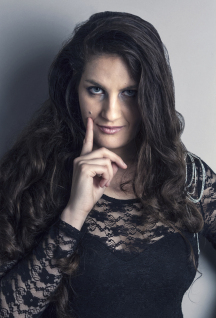 Erica Kudisch lives, writes, sings, and often trips over things in New York City. When not in pursuit of about five different creative vocations, none of which pay her nearly enough, you can usually find her pontificating about dead gay video games, shopping for thigh-high socks, and making her beleaguered characters wait forty thousand words before they get in the sack.
Erica Kudisch lives, writes, sings, and often trips over things in New York City. When not in pursuit of about five different creative vocations, none of which pay her nearly enough, you can usually find her pontificating about dead gay video games, shopping for thigh-high socks, and making her beleaguered characters wait forty thousand words before they get in the sack.
In addition to publishing novellas and short stories as fantastika-focused alter-ego Kaye Chazan (What Aelister Found Here and The Ashkenazi Candidate, both available at Candlemark & Gleam) Erica is responsible for the BDSM musical Dogboy & Justine, and serves as creative director and co-founder of Treble Entendre Productions.
She also has issues with authority. And curses too fucking much.
Facebook: Erica Kudisch
Instagram: hardhandmaiden
Tumblr: shitmywriterwifesays.tumblr.com
Twitter: @EricaKudisch
~
The Backup
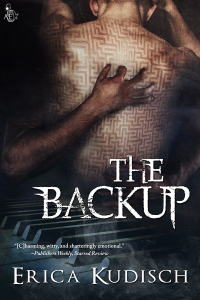 I’m supposed to be better than this. I’m supposed to have a tenure-track job teaching music history to undergrads, writing papers about Bach, and proving to kids like me that you can work your way out of Harlem. I’m not supposed to be following a rock star around the country, fetching his mail, making sure his groupies are of age.
I’m supposed to be better than this. I’m supposed to have a tenure-track job teaching music history to undergrads, writing papers about Bach, and proving to kids like me that you can work your way out of Harlem. I’m not supposed to be following a rock star around the country, fetching his mail, making sure his groupies are of age.
I’m definitely not supposed to be sleeping with said rock star, who claims to be the Greek God Dionysus. At first I thought it was a load of crap. Nik’s fans might think his music captures their hearts—and souls—but I knew better. Until one of Nik’s orgiastic concerts gets out of hand and I don’t know which is worse: that he might be a god after all, or that he has a body count.
Nik doesn’t care what I want or what I should be. He wants to tear down the world I’ve built, warping all I am, until his music is all that’s left of me. I can’t let him do that. I shouldn’t believe in him. I’ve seen what happens to the people who believe in him.
But I can’t get his song out of my head.
See more at: http://riptidepublishing.com/titles/the-backup#sthash.is4Bl37c.dpuf


March 10, 2016
A constantly shifting me
 When I write, I come to it as an actor. Last week my partner asked me what was wrong while I was trying to write a scene where Callum (who you’ll get to meet soon, we hope, in The Art of Three) was being pressed to discuss something he really, truly did not want to discuss — mainly his own bad relationship habits. Wrestling with his reluctance, I was definitely making a rather chagrined face.
When I write, I come to it as an actor. Last week my partner asked me what was wrong while I was trying to write a scene where Callum (who you’ll get to meet soon, we hope, in The Art of Three) was being pressed to discuss something he really, truly did not want to discuss — mainly his own bad relationship habits. Wrestling with his reluctance, I was definitely making a rather chagrined face.
In fact, characters infect me in all the time and in so many ways. A decade ago there was a three-month period where I was writing 16-year-old Narcissa Malfoy fanfiction and my goodness, I bought a lot of peach colored lingerie during that time. Narcissa likes pink, what can you do?
At any rate, a man just held a door for me. Another man asked me what floor I needed when I got on an elevator. Neither of those things — common, but oft gendered, courtesies — had happened to me in a long time until recently, but they are happening more and more lately.
Somewhere between A Queen from the North (which we also hope to have news on soon), my bizarre day job trip to Davos (ask me about celebrity wives and/or the Canadian Prime Minister), and The Art of Three, I started wearing makeup for the first time in years. My hair is done — even if it’s growing out awkwardly from my lestastic (that’s lesbian + fantastic) undercut — my eyes are bright, and I’m accessorized with a gauzy scarf liberated from my partner and a new bangle from the latest Rachel Zoe Box of Style.
If you’re wondering who the hell I am right now, you’re not entirely alone, even though nothing about me has really changed. Who I am is a person who lives and works and plays in many worlds. I am people who never were and people who will never be, and on some days, I’m even past versions of myself long since bartered away for my freedom and happiness. But what I am, most importantly, is a deeply, darkly, malleable creature who wants as many lives as they can possibly have.
That’s one of the gifts romance writing has given me — a confrontation with a type of femininity that has often felt difficult for me to engage. But as I keep saying lately, my upbringing and the life I was supposed to have because of it was like Pride & Prejudice, just with different dresses. It was beautiful, but it was not pleasant. However, now that I’ve figured that out, why eschew a little perfume and eyeliner when it, among other things, shows me so much about the women Erin & I write?
Because we do write women — as friends and as heroines. The two books mentioned in this post have actual romantic heroines. A Queen from the North is M/F and The Art of Three is an M/M/F poly romance. Erin and I are also in the early planning stages of an F/F (and maybe F/F/F) romance set in the golden age of Hollywood.
Mostly though, as our genre collectively battles through a period of difficult identity politics conversations in the romance genre that at times drift from “some readers find it important to read books about queer people that they know are written by queer people” to “only certain types of people are allowed to write certain types of stories, ever,” it’s important for me to remember that as I am malleable so are other authors and readers.*
For many of us, in fact, that’s one of the reasons we read and write fiction. To have more lives, more freedom, and more possibility.
(* Note: I’m on board with the first, and not the second, but would additionally like to add that research is important, and readers can and do have the right to criticize, especially if you make a hash of writing about experiences outside of your own)


March 9, 2016
5 things being a Mary Kay consultant taught me about being a romance author
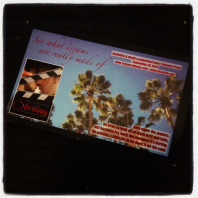
That one time we thought Love in Los Angeles magnets would be a super rad idea.
Once upon a time, and briefly, I was a Mary Kay lady. Recruited by a friend from high school, and seeing a potential income stream amidst aspiring actors and queer friends who didn’t have the time or inclination to buy makeup from someone who didn’t recognize their needs, I dove in. I didn’t hate it. I didn’t lose money. But I didn’t make money either.
That said, my now decade old Mary Kay experience keeps teaching me things about writing and selling romance novels, and I’m hoping some of these insights may benefit you or spur a discussion that can benefit us all.
1. Multi-level marketing never works. At core, Mary Kay is an MLM situation — those who can recruit a sales force under them make money, and those recruited need to do the same if they want it to work for them. Ultimately, this is unsustainable. Which means that blog hop that you’ve been chosen for if only you recruit two more people (who have to do the same thing down stream) to be part of it? It’s not going to get you page views, sales, or endear you to your friends. Choose blog hops around themes relevant to your work where the only person you have to recruit is yourself.
2. Specialized language is isolating. Mary Kay had a lot of very specific sales patter that applied only to Mary Kay products. Sometimes these wren’t just a barrier to us, the consultants, but too our customers. Similarly, the romance community has lots of industry-specific terms for things with other names elsewhere. Romance writers, for example, often refer to mailing lists as loops. There’s nothing inherently wrong with this, but it can be isolating to newbies and prevent those of us in the community from remembering to also look outside the genre for business inspiration.
3. Being positive all the time is exhausting. The number one Mary Kay rules was to always be positive. And look, no one wants to hear writers whine about their sales any more than they want to hear makeup consultants whine about their sales, but some types of professional honesty are important not only to our own endurance, but to helping the genre as a whole. Scam awards? Publishers that don’t pay? Sites like Writer Beware exist for a reason, and it’s a good one. Similarly, new and early-career writers need information on the realities of the business — it’s a shifting terrain, with varying levels of income and sales, populated by a range of authors with vastly different definitions of success. Be optimistic, be kind, be professional, but be careful of the tyranny of constant positivity in the face of things that are just wrong.
4. There is no one way to be a romance author. Mary Kay spent a lot of time telling me how to be a woman in a way that wasn’t relevant to me. Sometimes, the romance genre can feel like this too — whether it’s about who you are or what you write. But as long as you write relationship-focused stories with a happily ever after or happy for now ending, you belong here if you want to belong here.
5. Sometimes, but only sometimes, you’ve got to spend money to make money. This is the big one, but the answer is both yes and no. In Mary Kay this meant having product stock. In writing this can mean buying book stock for giveaways and in person events (something that’s hugely benefited Erin and I), or investing in yourself as if you were a publisher if you’re an indie writer. But too often in this genre there’s an arms race — about swag, advertising, about conference attendance, and more. Spend money on these things if they benefit you and in a way that fit your career and career stage. (Are you an indie? A professional editor benefits you). But don’t ever spend money on them to keep up with the Joneses. This is your writing career, no one else’s.


March 3, 2016
New news!
It’s like a rule of the universe around here that if we send out a newsletter on the first of the month (as we do every month — enter your email address at right to subscribe), there will be news on the second.
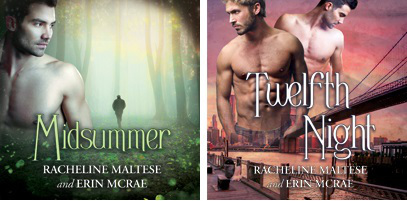 Midsummer and Twelfth Night are both on sale for 25% off at Dreamspinner now through March 8, 2016.
Midsummer and Twelfth Night are both on sale for 25% off at Dreamspinner now through March 8, 2016.
John Lyonel, a long-time theater professional and teacher, heads to Virginia to play Oberon in the Theater in the Woods’s production of A Midsummer Night’s Dream, intending to focus on his work. John is recovering from the tragic loss of his family and needs a break. The last thing he expects is to become captivated by Michael Hilliard, the professional actor playing Puck, especially since John has never been attracted to men, let alone one so much younger.
They rush headlong into an affair, which falls apart dramatically over secrets that John and Michael are keeping from each other. A steep learning curve, the gossipy cast of the show, and the sometimes sinister magic of the woods conspire to keep them apart. But stage lights and stars might work their magic and help them define a new future.
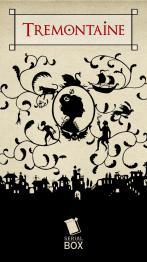 Meanwhile, Simon and Schuster’s Saga Press has picked up season 1 of Tremontaine for a print omnibus releasing in 2017. Season 2 of Tremontaine in audio and ebook will launch from Serial Box Publishing late in 2016.
Meanwhile, Simon and Schuster’s Saga Press has picked up season 1 of Tremontaine for a print omnibus releasing in 2017. Season 2 of Tremontaine in audio and ebook will launch from Serial Box Publishing late in 2016.
In a city that never was, sex, scandal, and swordplay combine in a melodrama of manners that returns readers to the beloved world of Ellen Kushner’s Swordspoint. A dance of betrayal and treachery begins when a Duchess, a scholar, a Duke, a genius, and a visitor from across the sea are brought together by long-buried lies.
Newsletter subscribers may also have noticed we listed a date wrong in the list of our upcoming book fair appearances. We can assure you that we won’t be time traveling and all those events are taking place in 2015. To keep up to date, please visit our events page.


February 28, 2016
Yup, bi romance really is a thing
 I know you’re reading that headline and wondering why I’m stating the obvious. The short answer is because it apparently needs to be stated.
I know you’re reading that headline and wondering why I’m stating the obvious. The short answer is because it apparently needs to be stated.
Yesterday, Erin and I were in our Philadelphia office doing a long, brutal edit on The Art of Three, which we now love and makes us cry from things other than exhaustion.
If you follow me on Twitter, you’ve probably seen me tweet about this book. It has a 48-year-old heroine, an MMF poly triad, pregnant lesbians, a woman with Down Syndrome who gets engaged, adult children confronting their parents on their failures, awkward best friends, nosy neighbors, difficult exes, and a dog named Vegetables. Also a Christmas wedding, a crumbling farmhouse in Spain, some London glitz, and Ireland’s #HomeToVote.
Which is to say, I really love this utter madhouse of a book, which feels like my life — with its interconnections and history and endlessly bizarre logistics — while being nothing like my life at all.
While Erin and I were working on it yesterday (we’re hoping to get it into submission this week), there was a multipronged Romancelandia kerfluffle re: bisexual romance that I actually restrained myself from getting involved in (a first, I know).
Today, after the fact, I’ve been obviously tempted to right a long thing about this issue. For one, bisexual romance is obviously real because bisexual people have romances with people of all genders and sexes in a range of relationship styles. Bi people and characters aren’t more or less bi because of who they are (or are not) in a relationship with at a given time.
 Sometimes Erin and I get email from people who want warnings if any female sexuality is going to show up in our books. While we’re super into letting people know what’s in the tin so they can make the best reading decisions they can, no we’re not going to give you page numbers so you can avoid the “icky girl bits” (yes, actual request in an actual email).
Sometimes Erin and I get email from people who want warnings if any female sexuality is going to show up in our books. While we’re super into letting people know what’s in the tin so they can make the best reading decisions they can, no we’re not going to give you page numbers so you can avoid the “icky girl bits” (yes, actual request in an actual email).
We’re disappointed to hear that a site run by some very well-known and high-profile romance authors published a piece that claimed bisexual romance didn’t exist. Just as we’re disappointed to hear that the organizer of an LGBT romance conference faced questions as to whether the event’s selected guests (each and every one of them representing at least one of those letters) were queer “enough.”
 I hope that most of us can agree things like this are harmful, archaic, and frankly, a little embarrassing.
I hope that most of us can agree things like this are harmful, archaic, and frankly, a little embarrassing.
If you’re looking for bisexual romance, our books Starling, Doves, Phoenix contain lots of bi characters; our novellas Midsummer and Twelfth Night are driven by them.
And as you can see by yesterday’s editing adventures, there’s more to come.


February 17, 2016
Where I get away with writing about Mark Strong’s hands by talking about A View from the Bridge
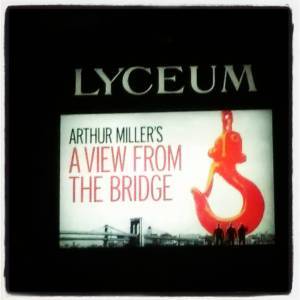
I took off my mitten to take this picture. That’s how dedicated I am.
I was in New York City this past weekend, with Ben, because it’s our annual tradition to pick the coldest weekend of the year to go tromping around a city in the Northeast surrounded on all sides by water.
(The windchill Saturday night got down to -28F. Sure I lived in Canada for a few years and generally like the cold, but that’s just ridiculous)
We ventured out in the midst of this arctic blast to see Ivo van Hove’s production of A View from the Bridge, and never was a venture into the cold so well rewarded as this one.
A View from the Bridge is a big story about a small family in mid-century Brooklyn. It’s about relationships and immigration and the economy and tradition. It’s very much about honor, or at least, about honor as it means to the Italian/Sicilian community in which it’s set.
But after two hours of absolutely captivating stage time, it was kind of hard to forget that it’s not a show all about Mark Strong’s hands.
It’s a minimalist production, performed almost in the round (there are seats on the stage itself). The set is comprised of a floor with a drain in it, edged on three sides with what looks like and occasionally functions as a bench. A door cut into a black wall serves as the exit and entrance point for the actors. It’s sparse and confining. The costumes are simple and vague as to time period. The actors are barefoot. The setting puts absolutely all of the focus on the story itself while removing everything that helps create the illusion that the story is real.
Eddie, as it becomes clear about thirty seconds into the play, is in love with his niece Catherine. How aware he is of those feelings — and how aware Catherine is of them, or of her feelings for Eddie — is left maddeningly and fascinatingly ambiguous throughout most of the play. Eddie is jealous of Catherine’s new job as a stenographer. He’s also wildly jealous and distrustful of Rodolfo, his wife’s cousin and an illegal immigrant who’s staying with the family, and who is courting Catherine. It’s not a story with any mystery to it — Alfieri, a lawyer from the community who serves as both narrator and chorus, tells the audience near the top of the play that Eddie’s story is a tragic one. And thanks both to the script and the staging, in those first thirty seconds it’s plainly apparent to the audience exactly what goes wrong and how.
And yet the story is anything but boring. Rather, tension builds, slowly at the beginning and then rapidly and unbearably toward the end and the inescapable conclusion. The minimalist setting removes anything that distracts the audience from the story unfolding on stage. It’s an intensely visceral, emotional story, and at the center of it all is Mark Strong’s Eddie Carbone. And, yes, his hands.
Now, Mark Strong is a big guy. If you met him in a dark alley, you might be a bit concerned. On stage, radiating guilt and anger and shame, he’s positively terrifying. And yet, he’s also shockingly gentle. He works with his hands, honest and necessary work. He kisses his wife, and dances with her. He brushes back the hair from his niece’s face in gestures that are somehow both sweet and, worrisomely, sensual.
The whole story of Eddie Carbone’s life — at least, all of his life that we get to see in the two hours we have with him on the stage — is told in his hands. The good, the bad, and the ultimately tragic and pointless.
And it’s that, the versatility of hands, that I find compelling, both on the stage and in the stories I read and write. On the subway ride back to the apartment where we were staying in Brooklyn — just blocks from where A View from the Bridge is set — Ben and I talked about the play. I struggled to put my feelings into words; emotions are always hard for me to express verbally, and the end of the play had hit me hard in a way I had no words for.
It wasn’t until Ben offered me his hand as we emerged from the subway station that I was finally able to make some sense of what I had just experienced. Hands are a point of connection, both for love and violence. They can be sexy or dangerous — or both at once. Their gestures force you — the audience, the listener — to pay attention to the words the speaker is saying; they also say what words can’t. In stories, and in life, they’re a vital part of how we communicate. The thought of hands in general, and the memory of Eddie’s in particular, are going to linger with me, I suspect, for rather a long time.





